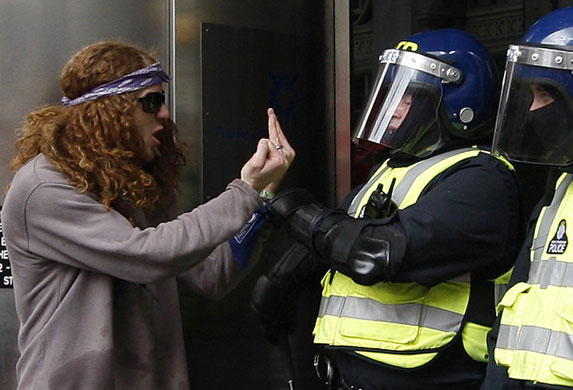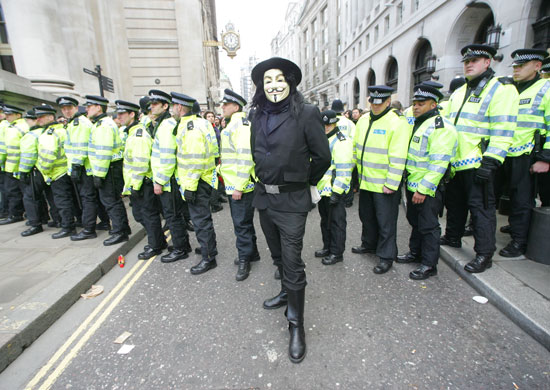Protesters who had wanted to demonstrate against the British banking system and capitalism in general, but who had also wanted to protest about climate change or the wars in Iraq and Afghanistan elsewhere in the capital, were hemmed in.
Officers forming a wall of fluorescent yellow told those who wanted to leave the area and were puzzled that they could not: "Don't ask us, ask the gaffer."
The area became a public lavatory as people unable to move away used the entrances to Bank underground station as a urinal.
In nearby Bishopsgate, at the Climate Change camp, the same policy of containment was used until later into the night and this morning.
This is a strategy called the "kettle", which sees protesters herded into an area and kept there for hours. Its stated aim is to contain a protest in a small area so it does not spread.
Granted it was unfortunate that yesterday's 4,000 strong protest resulted in the death of one protester, and vandalism of a Royal Bank of Scotland office, Campbell is determined not to confuse the line between civil disobedience and unlawful acts in order to provide a careful observation of what repercussions kettling tactics have on civil liberties of the citizens. He remarks that a) the decision of law lords to allow kettling essentially negates a peaceful protest's right to march, b) kettling had held a majority of the people against their will to leave the area and disperse regardless of intention, and c) police had taken photos and personal information including addresses from persons unknowing that they had a right not to provide this, but risked being detained for longer in the pen if they failed to co-operate.
Reader comments to Campbell's article makes for an almost interesting read on its own. It almost appears that Britain's most flagrant cynism has made an appearance amongst majority of comments that have sympathy for neither protesters nor police and government, with an ocassional apathetic citizen who's just happy that disruption was minimal so others could go about their working lives. One claims this legalised strategy is a deterrent to future protesters who will fear entrapment for much longer periods than their intended stay. This however, must surely be the final sentiment of a culmination of authoritarian acts that suddenly reminds me of a familiar nanny state. DNA databases, CCTV, ID cards will look like a cheap sacrifice of civil liberties if kettling becomes an effective deterrent. Whilst the former are a sacrifice of privacy, the latter is a sacrifice of freedom that can never be equal. Fear as a tool of control should never be understimated even in totalitarian and authoritarian countries that have laws up to the hilt, which are completely complementary to each other in maintaining order. I am completely for a strong police presence at any public demonstration and safety should always be the primary responsibility of all involved. However, it seems to boil down once again to Benjamin Franklin's sentiment that those who value temporary safety over essential freedom, certainly deserve neither safety nor freedom.

From what I've heard and read from sources I trust, great swathes of the police and more specifically their tactics were firmly in the wrong throughout. Kettling is an appalling ploy in its compromise of the right to assembly and should be seen off quickly. It also seems to have negative side effects on the designated area, given that the entrance to a tube station will look like a giant urinal after several hours of penned protest. Then there's the tear gas...
Good post
<< Home



.jpg)



